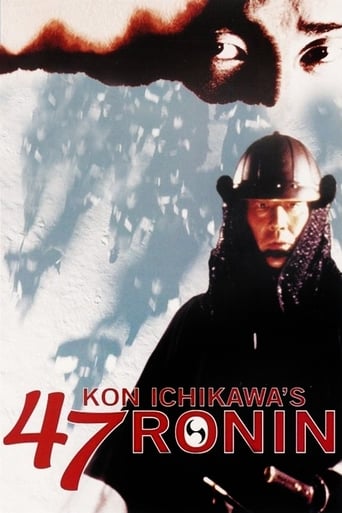rdoyle29
Kon Ichikawa's adaptation of the extremely popular "Chushingura" is good, but probably not a great intro for western audiences. It very much assumes that the viewer is familiar with the story and starts it in flight with very little explanation. That reservation aside, it's a great adaptation that has many stylistic call backs to chanbara cinema of the 60's without feeling old fashioned.
x-armani
47 Ronin (1994) is, in my opinion, the best non-Kurosawa Japanese movie to date. It is shot beautifully and it is obvious that every scene has been thoughtfully choreographed. The acting, I thought, was good, and so was the script. The plot line was, although at times difficult to follow, brilliantly executed and thought through.Ken Takakura's bold performance as Kuranosuke Ōishi was the strongest in the movie, and Kon Ichikaw certainly brought out the in him. The wardrobe and set designs were also fantastic, obviously a lot of time and effort was put into them to make sure their authenticity was correct.Overall, I believe the 47 Ronin to be a very good movie and definitely worth watching.
massaster760
The year is 1701, the setting Japan. In a relatively peaceful time, a reception held for envoys of the emperor, ends in a confrontation between two lords, which in turn would become the catalyst for one of the most famous stories of Japanese history. A story so famous it reaches mythical proportions and is widely regarded as Japan's national legend.The 47 Ronin (1994) is one of the many celluloid re-tellings of this famous story. Directed by master director Kon Ichikawa, 47 Ronin is basically a revamp of late 60's Japanese Samurai Cinema. Considering that Ichikawa made most of his greatest films in this time period (or before), the style of this film is going to be a foregone conclusion for those familiar with the director.As with most films of the genre, 47 Ronin is not an action film, most of the films time is devoted to the character development of Oishi Kuranosuke (expertly played by Ken Takakura), a chamberlain of the Ako-Asano Clan who loses his master to Seppuku. The Asano Lord was forced to commit suicide because of his provoked attack on Lord Kira during the reception for the envoys. In the aftermath, Oishi disbands the clan publicly and at the same time recruits a crew of 47 samurai. They patiently prepare their plans for a year and a half and then storm the fortress of Lord Kira in a mission that-succeed or fail- will ultimately end in their deaths.Kon Ichikawa leisurely unfolds his version of this classic, with beautiful cinematography,intricate set-pieces, and detailed wardrobes. Kon's shots of autumn trees and winter pagodas are breathtaking, and his perfectly framed shots work hand in hand with the highly detailed sets and costumes. Particularly, the Ako-Asano's black and white battle armor is truly fearsome looking.The action is characteristic of 60's Jidai Geki films; opponents square off, one or two strikes are exchanged, the kill shot, and the the obligatory geyser of blood. Although 47 Ronin is a bloody film it's not as bad as some of the more exploitational samurai films of the early 70's (such as the Lone Wolf series). And though the films action sequences are sparse, when they finally happen they are expertly directed and choreographed and are sure to please fans of the genre.Although this is a great film, in terms of plot, cinematography, acting, and action. I have to say that the films slow plotting tends to drag in spots and the films narration tends to get annoying after awhile. Plus the constant jumps in location tend to get a little confusing. I urge anyone interested in this film to read a little of the history behind it, as this will save the viewer from being confused by the story.Bottom Line- 47 Ronin should be seen for Ichikawa's expert direction and cinematography. It does tend to bog down at points but fans of samurai flicks will find delight in this film.
ETCmodel02
Beautifully shot, wonderful costumes, exceptional poetic imagery and majestic array of classically trained posturing women. However this film is amazingly obtuse, generally slow, incredibly dull minimalist payoff, improbable impregnation, and a couple of instances of Evil Dead style blood spray that seem very out of place. The political intrigue is neat, but that does not justify the pace or the ending, or the fact that many of the seemingly incidental plot spurs remain unresolved. I can appreciate that this is an attempt to recapture the classic style and posturing of the old Japanese & Chinese stage play forms and historical yarns like The Tale of Genji. Unfortunately, while beautiful, the film lacks the depth and loaded nuances of the classic form, and a superficial take on classical theater is far too shallow to really herald as a masterpiece. A good film to watch for visual form, but not a good example of story depth.


